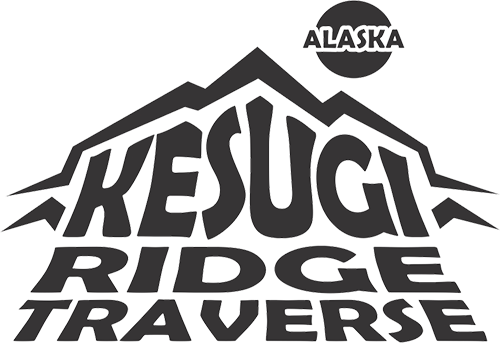FAQs
Is there a COVID-19 policy?
Please do not attend if you have COVID-19 symptoms or recently tested positive for COVID.
What does K'esugi mean?
It means the Ancient One in Dena’ina language. Traditionally the area was used as caribou hunting grounds.
Who are the two Dave Johnstons?
Dave Johnston the Younger (of Iditarod Trail Invitational fame), along with Andrea Hambach, created the Kesugi Ridge Traverse race in 2013 and directed it the first three years.
What are the current course conditions?
Will there be lots of snow up high?
Why has the race changed its date so many times?
On September 12, 2015, the race featured hypothermia-inducing conditions (rain and sub-40-degree temperatures). Matias Saari became race director in 2016 and moved the date to August 21; that year the weather was inclement but not quite hypothermia-inducing (high 40s and rain). In hopes of better weather, and to be scheduled before most other long Alaska running races, Saari moved it to late June in 2017. When Saari became director of the Mount Marathon Race in 2020, the June date for Kesugi was too close to MMR’s July 4 date so he moved it back to August so it could be properly organized. Kesugi will remain in early- to mid-August for the foreseeable future.
Why are there no aid stations?
There are no aid stations because Kesugi Ridge is a remote trail and hauling food and drink onto the course is not feasible. Volunteers are already hauling heavy packs with supplies to Ermine Hill Checkpoint.
A standard race pack has plenty of room for food, drink and emergency gear. Also, spectators are allowed to hand off sustenance and drinks to racers anywhere on the course (spectators may not pace racers, however).
For emergency purposes will cell phones work along the course?
Cell coverage is spotty at best. Racers should not rely on it. Course volunteers are equipped with Garmin inReach devices and satellite phones.
Why does the Half Traverse cost the same as the Full Traverse?
The Half Traverse costs the same because it requires just as much organization as the Full Traverse does.
If I’m in the Full Traverse but stop at the Half Traverse finish line, can I still get a result?
If I finish the Half Traverse but want to keep going to Byers Lake, can I?
Can the sweepers turn me back?
Can I wear headphones?
Headphones are discouraged. Participants need to be aware of other racers and of wildlife such as bears and moose.
Can I bring my dog?
If I decide not to race, can I get a refund? Can I transfer my bib to a friend? Can I get a deferral?
There are no refunds, transfers or deferrals.
Should I let the race director know if I am unable to race?
What is the camping situation at Byers Lake?
We have a group area at Byers Headquarters for Friday and Saturday nights of race weekend. It was greatly improved in 2020 and now has increased space that is suitable for car/camper camping and tent camping. There is no charge. RVs may NOT stay there. If you wish to stay at the main Byers Lake Campground (fees apply), plan to arrive early because it may fill to capacity on race weekend. Byers Lake also has several popular cabins available for rent.
Where can I stay besides Byers Lake?
Mary’s McKinley View Lodge (Mile 134.5) is one option. A fancier option is Mt. McKinley Princess Wilderness Lodge (Mile 133). There are also many pullouts along the highway where camping is possible. Lower Troublesome Creek (Mile 137.2) has some first-come, first-serve campsites. The new Kesugi Ken Campground (Mile 135.4) has become popular and allows reservations for tent camping, RV camping and public use cabins.
Will there be shuttles in 2024?
Post-race shuttles will be available. There are no pre-race shuttles; racers are responsible for their own transportation to the Little Coal Creek start and should carpool due to limited parking there.
Will there be swag?
Yes, there will be an item of Kesugi swag for every participant and volunteer (race hats have proven to be popular). There will also be prizes for the top performers and potentially some randomly awarded prizes.
Will there be beer?
What are the course records?
For the FULL TRAVERSE, Olympic skier Scott Patterson crushed his own record in 4:19:39 in 2020 (his previous record was 4:38 set in horrendous conditions in 2015). Tracen Knopp has the second-fastest time of 4:29 in 2020.
Christy Marvin of Palmer set the FULL TRAVERSE women’s record of 5:27:36 in 2018 en route to finishing 2nd overall.
For the HALF TRAVERSE, in 2022 Cody Priest knocked almost 10 minutes off Forrest Mahlen’s record with a time of 2:11:59.
Tsaina Mahlen reset the women’s mark in 2021 in 2:34:12, which was just 27 seconds faster than Yvonne Jeschke that year.
